Health and Healthcare Technologies
HFRG uses an evidence-based and user-centred approach to research to health service and social care systems and medical technologies through the application of novel and established human factors methodologies. This research provides insights and improvements in technology and facilities design, therapies and diagnostics, health and wellbeing training and education, involving stakeholders at all stages of life. The aim is to improve the quality and safety in co-production with clinical and health service professional users, patients and the public. Areas of interest are hospital environments, medical devices and digital technologies, and public health.
HFRG has, for many years, been involved in research and development of interactive digital technologies for a wide variety of groups including children in mainstream education, special education needs or with visual or hearing impairment. These projects have explored the use of new technologies, such as collaborative virtual and augmented reality, to provide new ways to engage learners, providing better access to learning materials and co-producing new ones. We employ user-centred and participatory design techniques and user-based evaluation.
From a healthcare humanities perspective, we draw on the key aspects of contemporary society, which includes increased human interconnection, technological innovation, and anthropological/ecological transformation.
Our interdisciplinary research brings together researchers from across the University and external organisations to tackle, more effectively, some of the most important challenges in improving well-being and health in contemporary society.
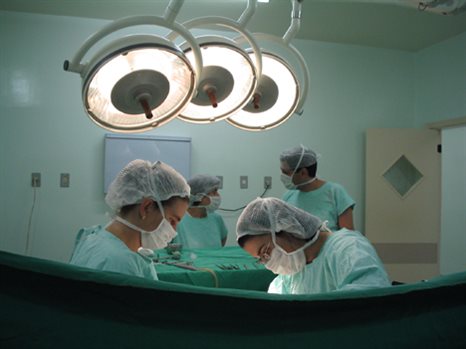
Current Projects
ADDP- Alzheimer's Disease Detect- Prevent
RADAR-CNS - Remote Assessment of Disease and Relapse – Central Nervous System
RADAR-CNS (Remote Assessment of Disease And Relapse – Central Nervous System) is a major research programme which is developing new ways of monitoring major depressive disorder, epilepsy, and multiple sclerosis using wearable devices and smartphone technology. RADAR-CNS aims to improve patients’ quality of life, and potentially to change how these and other chronic disorders are treated.
Data from mobile devices and wearables can give a full picture of a person’s condition at a level of detail which was previously impossible. This offers the potential to detect changes in behaviour, sleep, or mood before the individual themselves is aware of it. This could help them to predict – and then prevent – a relapse.
RADAR-CNS brings together clinicians, researchers, engineers, computer scientists and bioinformaticians from all over the world. It is jointly led by King’s College London and Janssen Pharmaceutica NV. The project is funded by the Innovative Medicines Initiative - a Public Private Partnership set up between the European Federation of Pharmaceutical Industries and Associations (EFPIA) and the European Union. It includes 23 organisations from across Europe and the US.
https://www.mindtech.org.uk/research/research-themes/objective-assessment-and-monitoring/radar-cns
Past Projects
PEGASO Fit for Future
Title: PEGASO Fit for Future
Funder: European Commission Framework Programme 7
Total value: €11,610,910
Start to End date: December 2013 – May 2017
HFRG members:
Summary:
Obesity and other lifestyle-related illness are among the top healthcare challenges in Europe. Obesity alone accounts for up to 7% of healthcare costs in the EU, as well as wider economy costs associated with lower productivity, lost output and premature death. Obesity in younger age is an alarming predictor for obesity in adulthood, but also entails short term health complications in juvenile age along with greater risk of social and psychological problems.
Knowing how to stay healthy is not enough to motivate individuals to adopt healthy lifestyles, but relevant progress can be achieved through the use of incentives delivered through a combination of processes and mobile technologies.
Recognizing the effectiveness of this approach, the PEGASO project will develop a multi-dimensional cross-disciplinary ICT system that will exploit sophisticated game mechanics to motivate behavioral changes towards healthier lifestyles and prevent overweight and obesity in the younger population.
The project relies on ICT technologies to implement a framework for the promotion of an health service based on three main features:
- individual and environmental monitoring, including wearable sensors, mobile phone and multimedia diaries for the acquisition of physical, physiological and behavioural attributes of participants;
- feedback to the user, presenting personalised healthy options for alternative lifestyles;
- social connectivity, encouraging involvement in social network experience sharing and social engagement.
For the system development, a user centered approach, social and networked games and online education will be used. PEGASO will be tested with over 300 adolescents in three EU member states (Spain, Italy, UK). The development of PEGASO project will mobilize a wide stakeholders' ecosystem contributed by National Health Authorities and Research Institutions, Industries and Academia from the ICT and healthcare sectors, as well as food companies and SMEs.
Key publications
Pegaso Fit for Future
I-BiT
Amblyopia, or ‘lazy eye’ is reduced vision in one eye which is usually treated by wearing a patch over the non-amblyopic ‘good’ eye for several hours per day, over a period of many months. Understandably, this treatment is not very popular with young children.
Working as a unique collaboration our multi-disciplinary team involves orthoptists, ophthalmologists and IT technologists from the Human Factors Research Group (HFRG), University of Hull and the National Health Service (NHS). Together we have devised a novel virtual-reality based system, the I-BiT™ system, in which children play interactive computer games or watch videos.
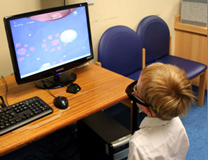
We have recently received a Wellcome Trust Translation Award to further develop the I-BiT system. The project runs from April 2010 to March 2013 and is currently in the developmental phase. The aim of our research is to provide a new way to treat amblyopia, that young children will find interesting and so comply with treatment.
The I-BiT™ system uses specially configured VR technology to allow more stimulation to the lazy eye to encourage this eye to be used. The innovation is that this is a binocular treatment and the non amblyopic “good” eye is not patched.
Early clinical trials have showed encouraging results, with increases in vision in some children after only six weeks of treatment.
For more information, visit the I-BiT™ website or email Dr Richard Eastgate.
MATCH: Multidisciplinary Assessment of Technology Centre for Healthcare
The MATCH project is an EPSRC Innovative Manufacturing Research Centre and a 10 year collaboration between 4 UK universities (Nottingham, Brunel, Birmingham and Ulster). The aim of MATCH is to improve the quality of medical devices produced in the UK and we aim to do this by supporting the healthcare technology sector and its user communities by creating methods to assess value from concept through to mature product.
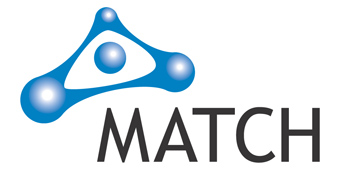
The MATCH project is an EPSRC Innovative Manufacturing Research Centre and a 10 year collaboration between 4 UK universities (Nottingham, Brunel, Birmingham and Ulster). The aim of MATCH is to improve the quality of medical devices produced in the UK and we aim to do this by supporting the healthcare technology sector and its user communities by creating methods to assess value from concept through to mature product.
Further information
Wayward: Informatics to identify and inform best practice in out of hours secondary care
This project will investigate the use of ‘locative and tasking’ informatics to learn more about clinical behaviour in out-of-hours secondary care settings, in order to drive improvements in safety, efficiency and effectiveness. The informatics system developed by the University of Nottingham team can capture data on clinical tasks, including the type, timing and location of activities, without the need for traditional direct observation.
Further information
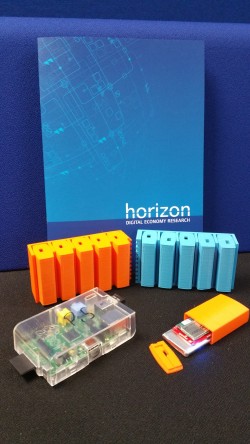
3D Tune-In: 3D-games for tuning and learning about hearing aids
Summary:
The challenge of 3D Tune-In is to facilitate the successful exploitation of existing, overlooked or neglected functionalities of hearing devices to optimise their potential and thus greatly improved people’s quality of life and their interactions with other people and their surrounding environment. Bringing together the relevant stakeholders from traditional gaming industries (Reactify, Vianet, XTeam, Nerlaska), academic institutes (imperial College London, De Montfort University, University of Nottingham, University of Malaga); a large European hearing aid manufacturer (GN Resound); and hearing communities through Associations (Extra Care, Hearing Link, Action Deafness, Accesibilidad y Personas Sordas, Ente Nazionale Sordi), 3D Tune-In will create a toolkit and different games tailored to different target audiences and contexts to help in the understanding of hearing loss and hearing aids.
Project partners:
- Imperial College London (ICL) – Project Coordinators
- De Montfort University, (UK)
- University of Malaga, Spain
- GN ReSound, Italy
- Reactify, UK
- Nerlaska, Spain
- XTEAM, Italy
- VIANET, Italy
Key contribution factors:
- Stakeholder engagement and elicitation of user requirements
- Evaluation and validation of game concepts
- User evaluation and validation of the technologies and apps
Publications:
- Craven MP, Goodwin R, Rawsthorne M, et al. Try to see it my way: exploring the co-design of visual presentations of wellbeing through a workshop process. Perspectives in Public Health. 2019;139(3):153-161. doi:10.1177/1757913919835231
- Craven MP, Andrews JA, Lang AR, et al., The RADAR-CNS Consortium. Informing the Development of a Digital Health Platform Through Universal Points of Care: Qualitative Survey Study. JMIR Form Res 2020;4(11):e22756. doi: 10.2196/22756
-
Harrington K, Craven MP, Wilson ML, Landowska A. Using Patient and Public Involvement to Elicit Opinion on Cognitive Training Games and Digital Assessment for People Living with Dementia. JMIR Serious Games/JMIR Preprints. 29/07/2021:32489. https://preprints.jmir.org/preprint/32489
- Eastgate, R., Picinali, L., Patel, H., & D´Cruz, M. (2016). 3D Games for Tuning and Learning About Hearing Aids. The Hearing Journal, 69 (4), 30-32 (link?)
- Picinali, L., D’Cruz, M. & Simone, L. (2015) 3D-Tune-In: the use of 3D visuals and sound to facilitate use of hearing devices. Conference paper at EuroVR 2015, Lecco, Italy, 15 – 16 October
- Picinali, L., D’Cruz, M. & Simone, L. (2015) 3D-Tune-In: the use of 3D visuals and sound to facilitate use of hearing devices. Poster and Demonstration paper at EuroVR 2016, Athens, Greece, 22 – 24 Nov [see ppt attached]
- Levtov, Y., Picinali, L., D'Cruz, M. & Simeone, L. (2016) 3D Tune-In: The Use of 3D Sound and Gamification to Aid Better Adoption of Hearing Aid Technologies. Conference paper at 140th Audio Engineering Society Convention. Paris, France, 4-7 June.
- Patel, H., Cobb, S., Hallewell, M., D'Cruz, M., Eastgate, R., Picinali, L., & Tamascelli, S. (2016, October). User involvement in design and application of virtual reality gamification to facilitate the use of hearing aids. In Interactive Technologies and Games (iTAG), 2016 International Conference on (pp. 77-81). IEEE. Link http://ieeexplore.ieee.org/abstract/document/7782518/
3D Tune-In online leaflet
3D Tune-In
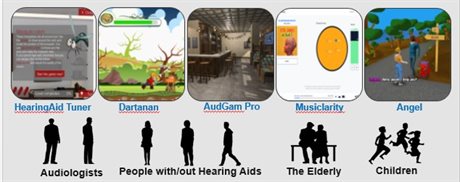
PhD Students
- Alex Lang (2012) Medical device design for adolescents
- Jeena Velzen (2016) A systems approach to improving design and practice in the United Kingdom
- David Pinnock “Producing and reproducing safe practices in healthcare”